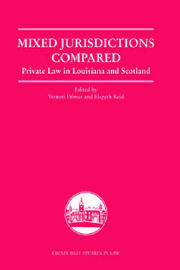Book contents
- Frontmatter
- Contents
- Preface
- List of Contributors
- List of Abbreviations
- Table of Cases
- 1 Praedial Servitudes
- 2 Title Conditions in Restraint of Trade
- 3 Servitudes: Extinction by Non-Use
- 4 Inheritance and the Surviving Spouse
- 5 Ownership of Trust Property in Scotland and Louisiana
- 6 The Legal Regulation of Adult Domestic Relationships
- 7 Impediments to Marriage in Scotland and Louisiana: An Historical-Comparative Investigation
- 8 Contracts of Intellectual Gratification – A Louisiana-Scotland Creation
- 9 The Effect of Unexpected Circumstances on Contracts in Scots and Louisiana Law
- 10 Hunting Promissory Estoppel
- 11 Unjustified Enrichment, Subsidiarity and Contract
- 12 Causation as an Element of Delict/Tort in Scots and Louisiana Law
- 13 Personality Rights: A Study in Difference
- Index
3 - Servitudes: Extinction by Non-Use
Published online by Cambridge University Press: 12 September 2012
- Frontmatter
- Contents
- Preface
- List of Contributors
- List of Abbreviations
- Table of Cases
- 1 Praedial Servitudes
- 2 Title Conditions in Restraint of Trade
- 3 Servitudes: Extinction by Non-Use
- 4 Inheritance and the Surviving Spouse
- 5 Ownership of Trust Property in Scotland and Louisiana
- 6 The Legal Regulation of Adult Domestic Relationships
- 7 Impediments to Marriage in Scotland and Louisiana: An Historical-Comparative Investigation
- 8 Contracts of Intellectual Gratification – A Louisiana-Scotland Creation
- 9 The Effect of Unexpected Circumstances on Contracts in Scots and Louisiana Law
- 10 Hunting Promissory Estoppel
- 11 Unjustified Enrichment, Subsidiarity and Contract
- 12 Causation as an Element of Delict/Tort in Scots and Louisiana Law
- 13 Personality Rights: A Study in Difference
- Index
Summary
INTRODUCTION
This chapter examines servitudes and their extinction by non-use. The type of right investigated is limited to “praedial” or “predial” servitudes benefiting a plot of land, known in Scotland as “the dominant tenement” and in Louisiana as “the dominant estate”. Although it will touch upon “legal” servitudes the coverage will exclude “natural” servitudes that are implied by law from a certain state of affairs without reference to the will of the owners of the dominant and servient tenements. As “negative” servitudes have been abolished in Scotland but not in Louisiana, this chapter concentrates on the common element: servitudes which afford the dominant proprietor the right to carry out certain activities on the servient tenement. These are known in Scotland as “positive” servitudes and in Louisiana as “affirmative” servitudes. The doctrine at the heart of the analysis is known in Louisiana as extinction by “prescription of non-use”, and in Scotland as “negative prescription”, or more anciently as “prescription of liberty”.
POLICY OF EXTINCTION
Prescription by non-use in Louisiana and negative prescription in Scotland, albeit existing in statutory form, are ultimately both generated by public policy. They ensure the marketability of land by freeing it from useless and unused restrictions. Grounded as they are in the general public interest, the doctrines are intended to override the will of individuals in specific cases. Consequently, in Louisiana parties may not by agreement renounce a prescription before it has occurred.
- Type
- Chapter
- Information
- Mixed Jurisdictions ComparedPrivate Law in Louisiana and Scotland, pp. 67 - 103Publisher: Edinburgh University PressPrint publication year: 2009

